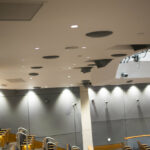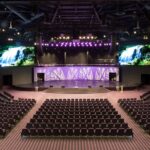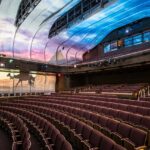Great audio and sound design has the ability to transform any space and make storytelling or communication come alive. By employing the latest acoustical technologies, our audio systems can “adapt” to the natural reverberant qualities of a venue or space and deliver an immersive experience for audiences and users.
For over 35 years, we’ve worked with organizations in almost every industry by helping them solve challenging engineering problems and integrate custom audio systems with a focus on thoughtful design and ease of use.
audio solutions we offer

Sound Treatment
Perfect for recording studios, performance halls, classroom/lecture halls, movie theaters, and courtrooms
Designed to improve the acoustic characteristics of a space by reducing low-frequency resonance and reverberation, sound treatment is often applied to walls and ceilings in areas where audio control and sound reproduction are important. Sound treatment is used extensively in recording studios, theaters, courtrooms, and classrooms (particularly lecture halls). More recently, office spaces with open concept designs have begun applying sound treatment to minimize distractions caused by loud and ambient noise.

Sound Masking & Speech Privacy
Perfect for courtrooms, corporate offices, healthcare facilities/hospitals, schools/universities, and banking/financial institutions
Sound masking is an acoustic tool that generates ambient background noise at a frequency equivalent to human speech which “interrupts” the sound waves making conversations less intelligible to anyone nearby. In an office setting, these systems can be used to reduce the distracting ambient chatter. In a courtroom, sound masking is used when counsel or judges require a private conversation while court is in session.

Sound Reinforcement
Perfect for houses of worship, concert venues, stadiums, conference halls, and movie theaters
Sometimes a space or venue isn’t designed with great acoustics in mind. A sound reinforcement system can help mitigate the poor acoustics of a space by using a series of microphones, speakers, auto mixers, and clever dynamic processing to distribute sound evenly to audiences, regardless of their location within a room.

Audio over Ethernet
Network-based audio systems are more cost effective and less complex than older analog systems that required expensive copper cabling and separate infrastructure to operate. Audio over Ethernet (AoE) can be operated on standard network cabling and is typically sent uncompressed. Depending on the quality and speed of the network, latency will be minimal with very high reliability.

Public Address & Distributed Audio
Perfect for airports, government buildings, schools/universities, emergency operations centers, healthcare facilities/hospitals, retail centers, and corporate buildings
Public address (PA) systems are a type of distributed mass communication technology designed to amplify and distribute announcements throughout a venue or facility. Most PA systems are integrated in larger buildings such as schools, stadiums, or airports. IP-based PA systems are becoming more popular due to the speed of deployment, lower cost of installation, and ease of maintenance.

Assistive Listening
Perfect for schools/universities, government offices, courtrooms, corporate conference rooms, and healthcare facilities/hospitals
Accessibility is becoming more important for organizations that want to provide equitable delivery of services. Assistive listening systems provide audio directly from the source rather than the environment like most hearing devices. Because the audio is delivered from the source, the quality is higher with much better clarity. Many of these systems transmit via RF, but new solutions are being offered with infrared delivery.

Audio Mixing & Control
Perfect for entertainment venues, houses of worship, recording studios, and radio/TV broadcast studios
Whether you’re converting analog to digital, routing audio to video, or recording a track, a well-integrated audio mixing and control system is essential to maintain a high level of quality for production or front-of-house operations. These systems are typically installed in control rooms and integrate with sound reinforcement systems, but can also be distributed to video for broadcasting. Many new installations are designed with AoE (audio over ethernet) in mind to extend the lifespan and increase interoperability with other systems.
industries we help











